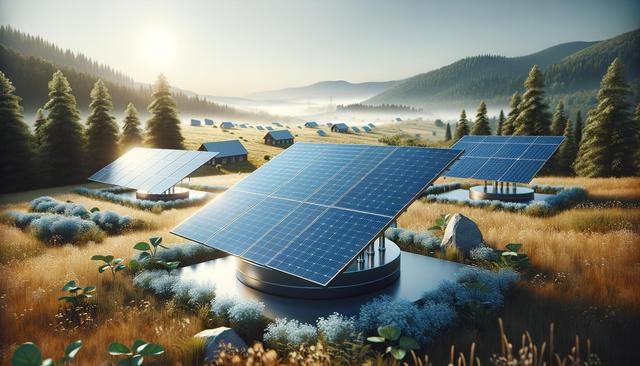Understanding the Basics of Solar Energy
Solar energy is derived from the sun’s radiation, which is a powerful and sustainable source of power. As more homeowners look for environmentally friendly and cost-effective solutions, solar power energy is becoming an increasingly popular option. At the heart of this transition are solar panels, which capture sun energy and convert it into usable electricity for homes and businesses. This process is made possible through solar PV (photovoltaic) technology, which uses semiconductor materials to generate electric current when exposed to sunlight. By installing solar power systems, homeowners can reduce their reliance on traditional energy sources, which are often tied to fluctuating prices and environmental concerns.
Solar panels are typically mounted on rooftops or open land areas with maximum sunlight exposure. These panels are connected to inverters and other components that help regulate and distribute the electricity generated. Depending on the size and configuration, solar power systems can produce enough energy to power an entire household, making them a practical solution for long-term savings and energy independence.
Economic Benefits of Solar Power Systems
One of the most compelling reasons homeowners are switching to solar PV systems is the potential for long-term financial savings. Although the initial investment in solar panels and installation can be significant, various incentives and rebates can help offset these costs. Additionally, solar power energy systems often lead to lower monthly utility bills, as homes begin generating their own electricity.
Key economic advantages include:
- Reduced electricity bills over the lifetime of the system
- Eligibility for federal and local tax credits or rebates
- Potential to sell excess energy back to the grid in some regions (net metering)
- Increased property value due to energy-efficient upgrades
Over time, the cost savings can make a noticeable impact on household budgets. For many, the breakeven point occurs within just a few years, after which the energy produced by sun energy becomes essentially free. This financial predictability is especially appealing in times of rising utility rates.
Environmental Impact and Sustainability
Beyond financial considerations, solar power energy systems offer significant environmental benefits. By harnessing sun energy, solar panels produce clean electricity without emitting harmful pollutants or greenhouse gases. This makes them a key player in efforts to combat climate change and reduce carbon footprints.
Installing a solar PV system contributes to:
- Lower greenhouse gas emissions
- Reduced air and water pollution compared to fossil fuels
- Decreased reliance on non-renewable energy sources
- Promotion of sustainable living practices
For homeowners who are environmentally conscious, making the switch to solar is a meaningful way to align their values with their everyday energy use. It’s a proactive step toward a more sustainable lifestyle that also supports broader global efforts to transition to renewable energy.
Technological Advancements and Accessibility
Solar technology has evolved significantly in recent years, making solar power systems more efficient, durable, and accessible than ever before. Modern solar panels are designed to perform well even under less-than-ideal weather conditions, and many systems come with long-term warranties that offer peace of mind to homeowners.
Some of the recent improvements in solar PV technology include:
- Higher efficiency panels that convert more sunlight into electricity
- Better battery storage options for energy use during cloudy days or at night
- Smart inverters that optimize energy production and monitor system performance
- Flexible installation options to suit different roof types and property layouts
These innovations have made solar more appealing to a broader audience, including those who previously thought it was out of reach due to cost or space limitations. With a growing number of providers offering customizable solar power systems, homeowners can find solutions that fit their specific needs and budgets.
What to Consider Before Making the Switch
Before investing in solar panels, it’s important for homeowners to evaluate a few key factors. Not every property is equally suited for solar power energy, so understanding the site-specific conditions is essential. Factors such as roof orientation, shading, and local climate can influence how much sun energy your panels will be able to capture.
Key considerations include:
- Available roof space and its exposure to sunlight
- Local regulations, permits, and incentive programs
- Upfront costs vs. long-term savings
- System size based on your household’s energy consumption
- Maintenance requirements and panel lifespan
Consulting with a qualified solar installer can help assess feasibility and design an appropriate system. Additionally, researching local guidelines and financial incentives can provide a clearer picture of the investment’s return. By taking these steps, homeowners can make informed decisions that align with their energy goals and financial plans.
Conclusion: A Smart Choice for Forward-Thinking Homeowners
Switching to solar energy is a decision that many homeowners are making for its combination of economic, environmental, and technological benefits. With growing awareness of climate change and rising energy costs, solar panels offer a practical and sustainable alternative. Whether driven by cost savings, a desire for energy independence, or environmental responsibility, solar power systems provide a reliable solution that continues to gain momentum across communities. For those considering the transition, now is a promising time to explore how solar PV can enhance both the value and sustainability of their home.




Leave a Reply